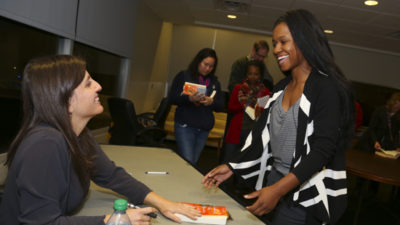Descendants of ‘Immortal’ have a voice at NIH table
HeLa cells, the most widely used human cell line in labs worldwide, were taken from the body of a young black tobacco farmer without her knowledge or permission in the 1950s. Today, her descendants get to help decide how the cells are used, protect their privacy and help science.
The “immortal” cell line, which continues to grow after more than 60 years, became one of the most important tools in medicine. The line was named for its donor, Henrietta Lacks (HeLa for short), and has been used in developing the polio vaccine, cloning, gene mapping, in-vitro fertilization and much more.
Rebecca Skloot, the award-winning science writer who made HeLa cells famous, discussed her research and book – “The Immortal Life of Henrietta Lacks” – during the Social Justice Book Lecture at the University of Missouri-Kansas City.
Skloot spent a decade chronicling the story, including getting to know Lacks’ family and winning the trust of Lacks’ daughter, Deborah. Lacks developed an aggressive cancer and went to Johns Hopkins Hospital for treatment, where her cells were taken. She died in 1951 at age 31.
The family did not know about Lacks’ “immortality” – or the profits her cells generated – until the 1970s, more than 20 years after her death. Today, HeLa is bought and sold by the billions with none of the profits going to the family.
Skloot wove together the story of Lacks, HeLa and the devastation the research process had on Lacks’ family.
Now, she could add a new ending to the story.
In 2013, scientists “sequenced Henrietta Lacks’ genome and made it public without asking the family’s permission. That is clearly a violation of privacy. But now the National Institute of Health has taken an important step in inviting two of Lacks’ descendants to be part of the Hela Genome Data Access working group, which considers applications to use the genome.”
During a 2013 National Geographic interview by Marc Silver, Skloot said “This is the third generation saying ‘This stops with us. From here on, we will be involved.’ It is the first generation of college-educated Lacks. They grew up knowing about the HeLa cells in a way no previous generation has. And what they’re doing is amazing – and will impact how other people’s tissues are used in research.”
After years of injustice the Lacks family now have a voice in how the genomes are used for years to come.
|Wandra Brooks Green, Division of Strategic Marketing and Communications

